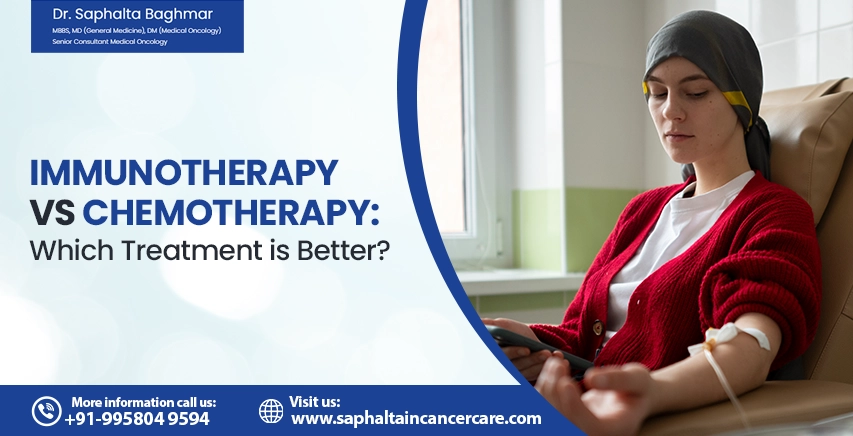Immunotherapy is an advanced form of cancer treatment that works by stimulating or enhancing the body’s immune system to identify and destroy cancer cells. Unlike traditional treatments that target the cancer directly, immunotherapy strengthens the body’s natural defense system, helping it to better recognize and fight cancer. The immune system is the body’s first line of defense against infections and diseases, and immunotherapy takes advantage of this by training it to attack cancer cells.
There are different types of immunotherapy, including monoclonal antibodies, immune checkpoint inhibitors, and cancer vaccines, all of which work in various ways to help the immune system target and destroy cancer cells more effectively. Immunotherapy has shown promising results in treating cancers such as melanoma, lung cancer, kidney cancer, and more.
What is Chemotherapy?
Chemotherapy, on the other hand, is a well-established treatment that uses powerful drugs to kill cancer cells or stop their growth. Chemotherapy drugs work by targeting rapidly dividing cells, which is a characteristic of cancer cells. However, chemotherapy doesn’t specifically target cancer cells and can also affect healthy cells that are rapidly dividing, such as those in the hair follicles, digestive tract, and bone marrow.
Chemotherapy is typically administered intravenously (IV) or orally, and the treatment plan usually involves cycles of chemotherapy, allowing the body time to recover between sessions. Chemotherapy can be effective in treating many types of cancer, but it often comes with significant side effects, including hair loss, nausea, and fatigue, due to its impact on healthy cells.
Immunotherapy vs. Chemotherapy: How They Work
- Mechanism of Action
- Immunotherapy: This treatment harnesses the body’s immune system to identify and attack cancer cells. It can be used alone or in combination with other treatments. Immunotherapy works by stimulating immune cells like T-cells to target cancer cells more effectively or by inhibiting checkpoint proteins that prevent immune cells from attacking tumors.
- Chemotherapy: Chemotherapy works by using cytotoxic (cell-killing) drugs to target and destroy cancer cells. These drugs are designed to interfere with cell division, which is why they are effective in treating cancers, where cells are constantly dividing. However, because chemotherapy doesn’t differentiate between cancerous and healthy cells, it can also damage healthy cells.
- Side Effects
- Immunotherapy: Immunotherapy is generally less toxic than chemotherapy, with fewer side effects. However, it can lead to autoimmune responses, where the immune system attacks healthy tissues in the body. Common side effects of immunotherapy include fatigue, skin rashes, fever, and digestive problems, but these are usually less severe than chemotherapy’s side effects.
- Chemotherapy: Chemotherapy has more widespread and intense side effects because it damages both cancer and healthy cells. Common side effects of chemotherapy include nausea, vomiting, hair loss, fatigue, mouth sores, and increased risk of infections. These side effects can be managed with medications and supportive care, but they can significantly impact the patient’s quality of life.
- Effectiveness
- Immunotherapy: Immunotherapy has shown remarkable success in treating certain cancers, especially those that are resistant to other treatments. For instance, immune checkpoint inhibitors have been particularly effective in treating advanced melanoma, non-small cell lung cancer, and some types of bladder cancer. Immunotherapy can offer long-term remission in some patients, and its effects can persist even after treatment ends.
- Chemotherapy: Chemotherapy has a proven track record for treating a wide variety of cancers. It is especially effective in cancers that grow and divide rapidly, such as leukemia, lymphoma, and testicular cancer. Chemotherapy can shrink tumors and reduce the spread of cancer, but the risk of relapse is higher compared to immunotherapy, especially in cancers that are resistant to the drugs.
Comparing the Pros and Cons of Immunotherapy and Chemotherapy
Immunotherapy:
- Pros:
- Targets the immune system, leading to more precise and specific action against cancer cells.
- Fewer side effects compared to chemotherapy.
- Can provide long-term remission and control over cancers that are resistant to other treatments.
- It can be used alongside other treatments for enhanced effectiveness.
- Cons:
- Not all patients respond to immunotherapy, and its effectiveness can vary based on the type of cancer.
- Side effects can include autoimmune reactions, which can affect healthy organs.
- Treatment can be expensive and may require extended monitoring for potential complications.
Chemotherapy:
- Pros:
- It has a long-established track record and is effective against a wide range of cancers.
- Chemotherapy is often used in combination with other treatments like surgery or radiation therapy for enhanced results.
- It can reduce tumor size and prevent cancer from spreading.
- Cons:
- Can cause severe side effects, affecting healthy cells in addition to cancer cells.
- The recovery time between cycles can be long and challenging for patients.
- There is a risk of developing drug resistance, meaning chemotherapy may lose its effectiveness over time.
Which Treatment is Right for You?
The choice between immunotherapy and chemotherapy depends on various factors, including the type of cancer, its stage, the patient’s overall health, and how the cancer has responded to previous treatments. In some cases, a combination of both therapies may be recommended for optimal results.
- Immunotherapy tends to be more effective in cancers where the immune system can be trained to fight the cancer, such as melanoma, non-small cell lung cancer, and certain lymphomas.
- Chemotherapy is often used in more aggressive cancers, cancers that grow quickly, or when immunotherapy is not an option.
A multidisciplinary approach, where both immunotherapy and chemotherapy are used together, is often seen in treating certain cancers. For example, chemotherapy can shrink tumors, making them more accessible for surgical removal or more responsive to immunotherapy.
The Future of Immunotherapy and Chemotherapy
While chemotherapy remains a cornerstone of cancer treatment, immunotherapy is rapidly gaining ground as a promising alternative or adjunct. The advent of personalized medicine and targeted therapies is improving cancer treatment outcomes, and ongoing research is focused on finding new ways to combine immunotherapy and chemotherapy for better efficacy with fewer side effects. As science progresses, immunotherapy may become more widely available, with broader applications across various types of cancer.
Conclusion
Both immunotherapy and chemotherapy are vital tools in the fight against cancer, each with its unique strengths and limitations. While chemotherapy has been the standard treatment for many years, immunotherapy is paving the way for more precise, less toxic treatments that can offer long-lasting benefits for certain types of cancer.
Ultimately, the decision to use immunotherapy, chemotherapy, or a combination of both depends on individual factors. Discussing treatment options with an oncologist will help determine the best approach based on the patient’s needs and cancer type. As cancer research continues to advance, the future holds promising possibilities for even more effective and less harmful treatments.



